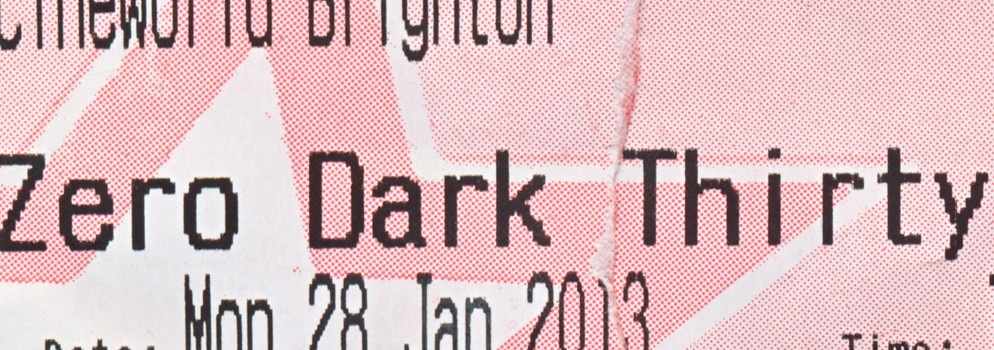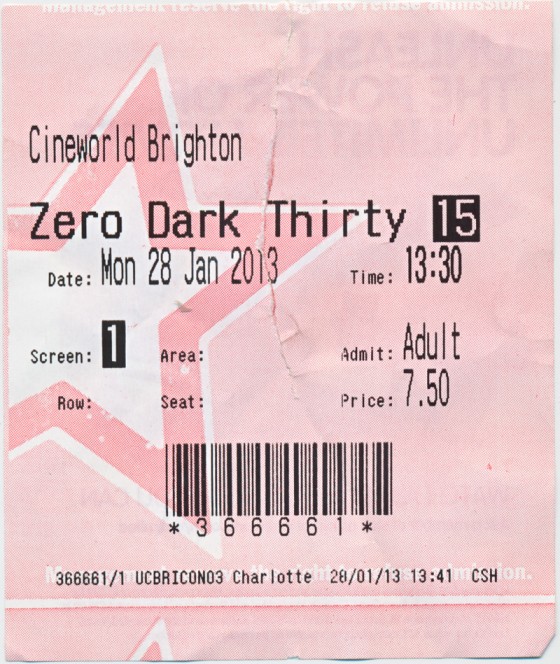Zero Dark Thirty

I Can’t Believe They Downgraded Al Qaeda…to co-producer!
We sleep soundly in our beds because rough men stand ready in the night to visit violence on those who would do us harm. – Winston Churchill
Winston Churchill has never been wrong about anything, at any point in history, about any subject, ever. – Everybody, apparently

Let’s get this out of the way: torture doesn’t work.
It was, as it happens, disproved as an effective method of gaining information four hundred years ago. The story goes that a suspicious Milanese judge decided to conduct what might be called an empirical experiment. Being that torture was common practice at the time, it should not surprise us that he employed some ethical no-nos to do it. The judge kills his mule and accuses his servant of the crime. Under torture, natch, the man confesses, and, here’s the clincher, won’t recant even as he’s about to be executed, for fear of getting tortured again. You can read about it here, albeit in French (page 109).
There are some people who will tell you that torture works, and they’re right. How is this possible? Well, technically speaking, it’s like Episode 1. It did make its money back, so technically it worked, but being the long-anticipated sequel one of the most successful films (in adjusted box office and population) of all time, it should have made billions. It didn’t. It was a failure. This is because watching it was, that’s right, torture. Likewise, we could gain the same information, faster, more effectively, and more completely with classic style, albeit difficult, interrogation. Why do we keep doing it? Because the people who make political decisions of this nature are stupid as movie critics:
‘(I)t looks with disturbing clarity at the ”enhanced interrogation techniques” that were used after 9/11, and it says, in no uncertain terms: They worked.‘ This is fair enough, and by that I mean that we should no longer count on the press to inform us of the accuracy of something. After all, research is so impossibly difficult today. You have to click on the ‘drive to the library button’, click on the ‘wait in the line for the research desk’ button, and then enter ‘were the 7/7 murderers actually in any way related to AQ, or were they in fact splinter AQ, and therefore have nothing fucking whatsoever to do with Osama bin Laden’ into the librarian search field. Who has the millisecond?
Initially there was a long rant about how Sen. John McCain is wrong about people being so stupid that they would get all their historical information from films. Until I found the above quote, which proves that he was right. Look, I don’t want people to censor films, and so I make my arguments that way, even if the evidence is staring me in the face. Why they don’t just cut out the middle man and censor idiots is beyond me.
And, like Sen. McCain, and me, I suspect it’s a case of people already believing what they would have anyway. But whether or not torture works, or films can trick people into believing that it did, or rather, trick them into believing what they already did, and, at the risk of being kicked out of any country that loves war (all of them), I will say that the problem with torture isn’t that wrong, or right, or effective or ineffective, or that the first half of Zero Dark Thirty is basically an AQ recruitment infomercial, but that torture is fucking boring.
Let me explain. The purpose of torture in film, as any self-respecting sadist will tell you is to engender sympathy. It works fine in a Shane Black kinda way, which inevitably involves a just a skosh of S ‘N’ M homoeroticism (or more than just a skosh, for those of you who have seen Django Unchained), as our various Mel Gibsons and Robert Downey Junioreses and Jamie Foxes are strapped into various chairs, inexplicably shirtless, and asked questions, only to escape moments later to Visit Vengeance Upon. This is, as has been noted, mostly by me, and by way of making fun of This is 40, what makes Zero Dark Thirty a AQ recruitment film. Torturing someone demands retribution, and we’re left oddly as an audience waiting for Mitchell and Webb to appear in the background and ask if we are, in fact, the baddies.
As an actual narrative device in and of itself, however, torture just kind of lies there. Real torture, which I suspect few who are currently writing about the debate have experienced, is not boring. But for the story it’s dull. This is because, like the irksome Writer’s Block Film, the struggle is internal. Despite the various things that our erstwhile Jack Baueres visit on the victim, the actual story part isn’t that interesting. I’m not going to tell you, I’m not going to tell you. Oh, now I will.
We want it real, said the various executivi. You know, Batman real.
And so we get to Det. Second Grade (at the time; I’m aware he made first grade, but we’re talking seasons two through five. Jeez) Sipowitz, and what is not boring. What Mr. David Milch got so well was the thrill of the interrogation: tricking someone through threats, love, lies, and empathy into throwing their lives away. The thrills could have doubled here, as interrogation is actual drama involving choice (which torture does not), as well as a peek into a character’s desires and goals, an insight which God forbid (literally) should be allowed in the case of anti-American terrorists.
But this is about the film, and it has the right to say that torture is effective (it isn’t), or that it was crucial in gaining intelligence about (it wasn’t, see ‘it isn’t’, fourteen words previous). This is especially depressing since the actual story of the hunt for UBL – which you can read about in Peter Bergen’s excellent Manhunt – is a story of how intelligence is produced, through multiple characters, multiple motives, guesswork, politics, intimidation, sympathy, bluffing and luck. It’s, you know, dramatic.
I suspect the same could be said of a group of producers too cheap to option the book written by an expert and hiring a Voice hack to write the gritty screenplay after twenty seconds of research, and filling it full of tired CSI: Miami tropes. I imagine the conversation as such: We want it real, said the various executivi. You know, Batman real.
Speaking of accuracy, Mr. Mark Boal is technically a Playboy hack, but I wanted to insult him.
Anyway, instead of the potentially dramatic story, we get the Hollywood version, replete, and here we finally get to the Oscar part of this piece, the craptacular performance of Ms. Jessica Chastain. Now I like actors. For the most part, I don’t even notice them and this is the highest compliment one can make. There is a level of craft out there that is shared with the various directors of photography, CGI masters, and set-builders, that actors know enough how to embody and leave it that. It’s a shame that the same cannot be said of the writers and directors and producers, but that’s another piece. Sorry, many other pieces, which I have already written and in which I have repeated myself endlessly. And will repeat myself again.
I would take it a step further and say the actors that we see onscreen have passed a certain crucible and tend to be good, investing the typically bland material with a kind of humanity. Crediting Mr. Robert Downey, Jr. with the entire success of the first Iron Man or Mr. Johnny Depp with the Pirate Franchise would not be inaccurate. Unfortunately when we get the less than average script combined with lazy direction and an unexperienced and potentially successful too soon actor, it’s a perfect storm…of weather metaphors of storms. And hence with Ms. Chastain, you get all the right reactions, and hence, a terrible performance.
What’s that now?
Well, like you, I’m an avid fan of Mr. James Lipton and Inside the Actor’s Studio, where, and let’s be honest, Mr. Lipton’s utter seriousness never stops being funny. Also, I love celebrities, an excuse to watch them that isn’t Access Hollywood. Also, I love Access Hollywood. Anyway, at some point, someone was talking about Sir Lawrence Oliver and his approach. I don’t know who it was, or if it was true, or even if I saw it and remember it correctly, but the story goes that his technique was to start with the opposite of an appropriate reaction. If character was supposed to feel ashamed, Sir Olivier would begin with laughter, with anger, and it would be shame and so on.
It’s something that stuck with me, being that human beings are complex or whatever. The telling and painful to watch exception is Ms. Chastain, who simply indicates what her character Should Be Feeling. When she’s supposed to be afraid, she’s ‘afraid’, indignant, ‘indignant’ and so on. There’s a moment of desperation, that made it in the trailer (‘I believe it because she believes it. Also, because the writer really didn’t do his research‘) when the other characters talk about how great she is, as if they knew we would not be convinced. It’s not unlike the inexplicable choice in the remake of The Tourist, where, and I’m not kidding, characters are heard to whisper ‘She’s so pretty’ as Ms. Jolie walks by. See it.
I mean, don’t, God, please don’t, but the point is, if the other characters are talking about how great your lead is, you’re in trouble. Especially if she was to, say, react strongly during an interview when one of her suspects gives up the name of the man she’s been hunting, the one thing you don’t do in an interrogation. This moment, and ultimately the whole film, feels pedantic, that we wouldn’t understand that this moment was important unless – like a Shakespearean aside in a Mike Leigh movie – someone was rolling their eyes and sucking in oxygen.
Sipowitz wept.
The Take

-$2.50
The Lonely Comments Section

 [logo]
[logo]

